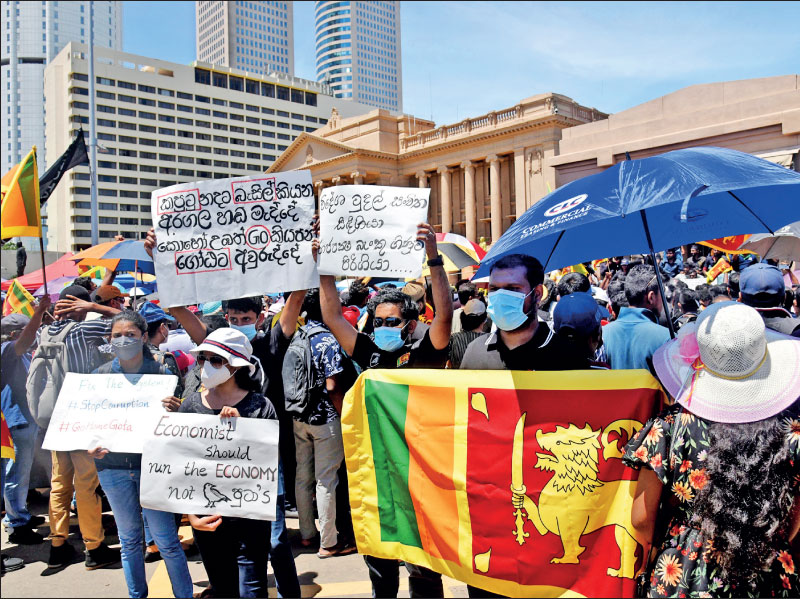Monday Feb 16, 2026
Monday Feb 16, 2026
Friday, 20 May 2022 00:45 - - {{hitsCtrl.values.hits}}

At the height of the youth uprising, had they insisted on appropriate and achievable reforms instead of tenaciously adhering to the slogan of ‘GotaGoHome’, most probably the reforms that the country needs badly at this moment could have been won
 By the 11th, the country was in a sorry state without a Prime Minister or a Cabinet and was on the verge of total anarchy. However, the appointment of a new Prime Minister on the 12th was a good omen that has brought new hopes in the face of uncertainty.
By the 11th, the country was in a sorry state without a Prime Minister or a Cabinet and was on the verge of total anarchy. However, the appointment of a new Prime Minister on the 12th was a good omen that has brought new hopes in the face of uncertainty.
Ranil Wickremesinghe is no stranger to the post of Prime Minister. He is an ace veteran. This is his sixth term in this office; perhaps it may be a new world record in the subject. Despite many criticisms levelled against him, he could be considered as the foremost figure among the members of parliament in terms of knowledge and experience as well as his ability to work with the international community. His appointment to the post of Prime Minister with the patronage of the ruling party which, at the moment, is being vilified by the people of the country could be seen as a factor that diminishes his importance at this stage.
But in view of the current composition of the Parliament, not only Ranil Wickremesinghe but anyone else (Sajith Premadasa, Karu Jayasuriya or anyone outside the ruling party) could be appointed to the post of Prime Minister only with the patronage of the ruling party. If Sajith Premadasa, the leader of the Opposition had volunteered to accept the offer when he was invited to take over the PM’s post and made Ranil Wickremesinghe, his former leader, the Minister of Finance in his Cabinet, it could have proved to be a very colourful event. Similarly, if the Samagi Janabalawegaya led by the Opposition leader had followed a policy of supporting Ranil after the latter became the Prime Minister that too would have been a very colourful phenomenon.
At this critical juncture, what the country should have considered important was whether Ranil Wickremesinghe has the ability to fulfil the limited role entrusted to him, effectively, namely the administration of the country until the next general election envisaged to be held as early as possible while in the meantime providing necessary relief to the people affected by the balance of payments crisis, and building a solid foundation for resolving the problems associated with it. But, what the educated intelligentsia of the country seems to have valued more is not his ability to do that, but other trivial matters which are not relevant to the problem.
The question here is whether the Prime Minister Ranil will be able to overcome the challenge posed by the community of educated opinion makers which is anarchic not only in terms of several aspects but also in thoughts and aspirations as well, which is more difficult to be resolved than solving the balance of payments problem. It could be considered as a challenge likely to be encountered not only by Ranil but also by any other person (Sajith, Karu Jayasuriya, Sarath Fonseka, Anura Kumara Dissanayake or anyone else) who might have assumed the post of Prime Minister at this moment.
In view of the anarchic situation that prevails in the psyche of the educated community and opinion makers in Sri Lanka at the moment, it is most likely that the country would be plunged into a catastrophic end. Perhaps, judging by the prevailing trends, the wisdom of assessing the issues with a rational perspective may dawn on Sri Lankan society only after the crisis has reached the optimum level of misery that surpasses the present level of it.
The popular slogan ‘GotaGoHome’ is a good example that can be cited to illustrate the degree of chaotic and unconstitutional nature of the social and political psyche of Sri Lanka during this time of crisis. The system of governance has been deliberately formulated by the ‘78 Constitution in such a way that the presidential rule cannot be defeated in an interim stage so easily, except by an impeachment or at a presidential election. Even if the Government is defeated by a no-confidence motion against the Prime Minister and the Cabinet of Ministers, it will not affect the President despite the fact that he is the head of the Cabinet. It only affects the Prime Minister and the Cabinet of Ministers; apart from that, in an extreme situation it could affect the Parliament.
The only constitutional provision that can be used to oust an incumbent President would be to move an impeachment motion against him. As per the provisions made in the Constitution, it is extremely difficult to win an impeachment. It also requires two-thirds majority in Parliament. Although the President can be asked to resign, he is not constitutionally obliged to accept such a demand, even when it has been made with the strongest possible force. He can resign if he wishes. Even then, the next President will be decided by Parliament and again by the most powerful political group in Parliament.
Any violent or peaceful attempt to send the President home outside the provisions of the Constitution can be considered as an unconstitutional ‘revolution’. Although, it may be possible to defeat the President in the end with a tremendous effort launched for that, what is the use of such a revolution if it eventually plunges the country to an extreme misery and a state of anarchy where the banking system is ruined, the institutional system has collapsed and poverty and famine are rampant?
From the very beginning of this youth uprising, my conviction and request have been that the struggle should be directed towards a constitutional path. I made that request through my writings and video talks. This I did, to some extent, for the knowledge of the educated elders who have become the opinion makers and counsellors of these young people, rather than for the knowledge of the young people themselves who are engaged in the struggle. But the educated elders have almost unanimously endorsed the path chosen by the youth in the struggle, thankfully, and affirmed that it was the right one. They encouraged and stimulated the generation of youth and insisted that they should continue the struggle on the path chosen by them.
They do not seem to have enlightened the youth that their main demand is contrary to the Constitution and the devastating consequences it could result in when trying to win it by force, albeit innocently. Demands should always be tenable; and should not to be based on things that are impossible to be given like one’s own neck. At the height of the youth uprising, had they insisted on appropriate and achievable reforms instead of tenaciously adhering to the slogan of ‘GotaGoHome’, most probably the reforms that the country needs badly at this moment could have been won. Wouldn’t it have made more sense if it had been possible to persuade the President who at present stands above the law, to agree on a constitutional amendment to bring himself under the rule of the law and effect necessary reforms instead of stubbornly adhering to the slogan of ‘GotaGoHome’ which is not easy to achieve?
Even at this stage, if the younger generation is prepared to abandon this slogan which is untenable, and even if it is won, would have incurred an undeserved and irreparable recompense, and come forward with a series of tenable reforms that would result in a sweeping system change, certainly it will prove to be something that could be practically won. Only then will their forceful uprising go down in history as a struggle that has brought desirable and beneficial results to the country.